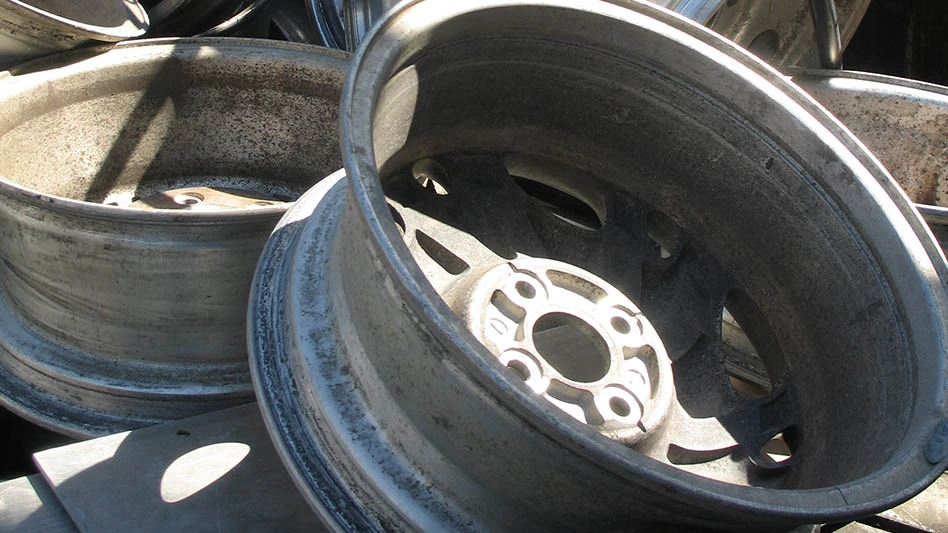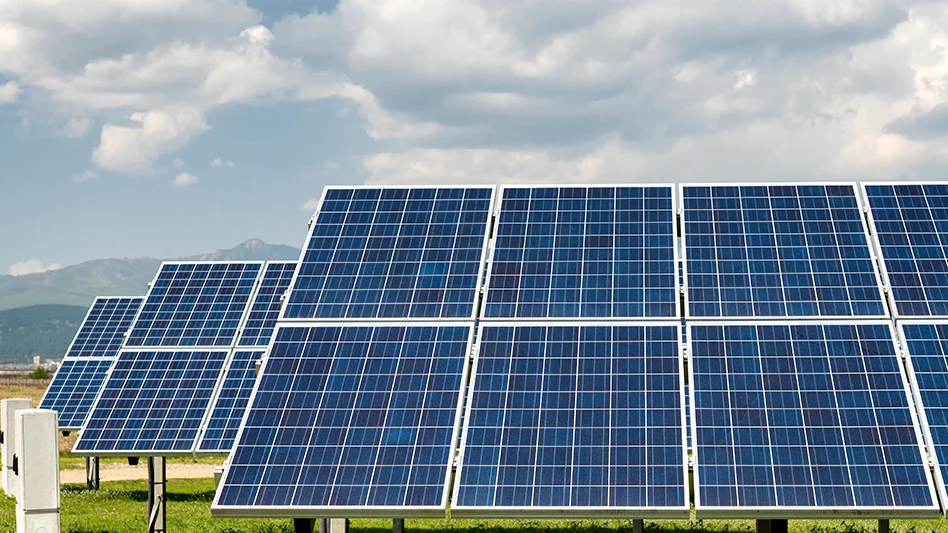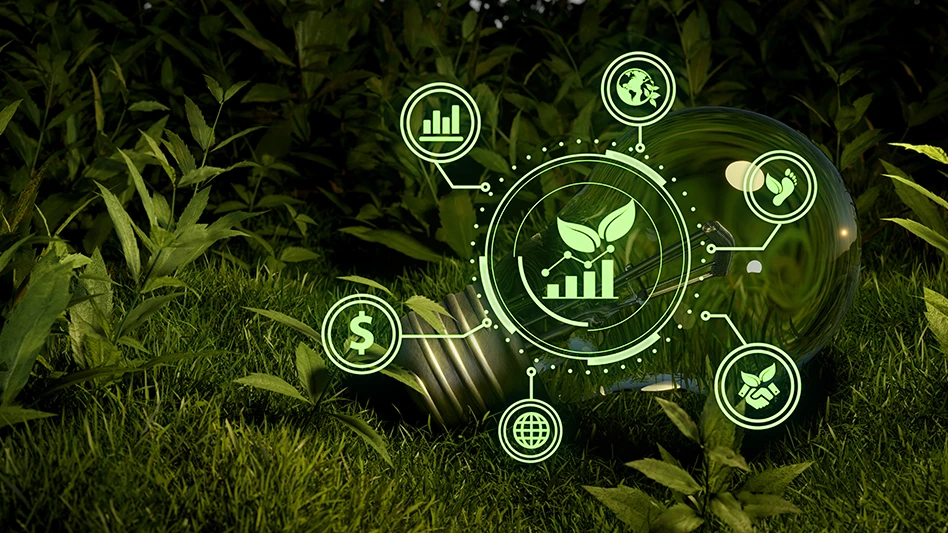 Recycling has long been a part of Alcoa's history as well as that of the aluminum industry's in general. Kevin Anton, chief sustainability officer of the Pittsburgh-based company, says, "It is a very significant part of our business."
Recycling has long been a part of Alcoa's history as well as that of the aluminum industry's in general. Kevin Anton, chief sustainability officer of the Pittsburgh-based company, says, "It is a very significant part of our business."
The importance of recycling to Alcoa's business has prompted the company to invest in many initiatives in the last year, including taking a stake in Fresno, Calif.-based Electronic Recycling International (ERI), upgrading its Tennessee can reclamation facility, constructing a new facility in Ohio to recycle truck wheels and constructing new recycling furnaces in Spain. "We are putting capital in the ground to be able to increase our usage of scrap and, at the same time, taking efforts to increase the supply side of scrap, particularly the can. It is pretty fundamental to who we are," Anton says.
In the following Q&A with Recycling Today Managing Editor DeAnne Toto, Anton discusses Alcoa's investment in ERI and the growth potential of the aluminum industry.
Recycling Today (RT): Alcoa took a stake in ERI in 2011. What made the company an attractive investment? What does Alcoa hope to gain through its relationship with ERI?
Kevin Anton (KA): If you think about consumer electronics, you often have products that have life cycles of less than two years. You start to think, "How can the world allow products that are so prolific and that have such a short life cycle and not have a proper end-of-life solution for them?" We see consumer electronics as being a great growth market for aluminum because of the recyclability plus the attributes that aluminum brings to the product. It's got great consumer appeal through the look and the feel, but also the thermal properties of aluminum help the designers manufacture the product smaller, thinner, lighter, and the heat dissipation properties of aluminum help the designers manage the heat from the circuitry. It is a real win-win.
Just like when we helped establish the market for the aluminum can—we are the leader in that market—we recognized that there was a need to create closed-loop recycling and get the cans recovered, and we built the infrastructure to do that. The analogy here is that we are helping establish the infrastructure to bring that aluminum back in a closed loop and make sure it doesn't go into landfills.
As we started looking in this space, we wanted to find a company that on a values basis and in terms of growth ambitions lined up with Alcoa. I met John Shegerian at ERI and immediately there was a mix of cultures and a mix of values. We saw a successful entrepreneur who had the ability to grow his business exponentially and we saw that Alcoa could help him do that.
RT: What role will Alcoa play in helping ERI expand its electronics recycling technologies?
KA: What we can help them with after they recover the aluminum is how they can sort it and package it to get maximum value.
We are helping them with capital. We are helping them with management systems. As the company grows, its span across the country will be greater. We can help them learn how to manage remotely, learn how to manage seven facilities versus two facilities and how to leverage management capabilities across the country. They are a very capable management team that can learn bits and pieces from Alcoa because we have already gone down these paths.
I sit on the board of directors of ERI. It is a great group of external directors with diverse backgrounds. All of the directors bring unique talents, contacts and experience to help John drive the business to where it needs to get to.
RT: When you talk about sorting and packaging the aluminum to get maximum value, are you talking about identifying the many grades of aluminum and segregating material based on grade?
KA: Yes. It is about helping them package it up so that you keep the cast, the extrusions and the sheet separate from each other so they will have more value to the ultimate remelter. By simply making sure the back panels from LCDs don't get mixed in with the heat sinks from PCs, for example.
RT: Have you arranged to be the primary recipient of material from ERI? Or will ERI put that material on the open market for sale?
KA: We have an arms' length relationship with ERI. Some of the aluminum that they generate will naturally fall to Alcoa because we'll have the best logistics and the best use for it. Other places, for example, their Fresno facility, Alcoa doesn't actually have anything all that close to Fresno where we could be using the material, so that aluminum most likely will end up in the free market.
I think "coordination and cooperation" is the right way to phrase it.
RT: Will Alcoa have a role in ERI's expansion of its footprint in the U.S. and abroad?
KA: Yes. The focus today remains expanding in the U.S. and opening new, expanded facilities in the Annapolis (Maryland) area, in the Boston area, in North Carolina—the North Carolina site actually happens to be an old Alcoa site and we are actually the landlord, too. We are helping with some management expertise. Our equity contribution when we bought into ERI obviously helps fund this.
The next step will be to start to look overseas. But there is an awful lot involved in next 12 months in getting three facilities ramped up in the U.S. at the same time. That is what John will be focusing on. Then we will start looking overseas—India, the Middle East, South America. There are lots of opportunities. I think we will go where the core strengths are for us and ERI. ERI has already built some great relationships in India. The other two locals are where Alcoa has an expanding presence.
RT: Does Alcoa have similar investments in the electronics recycling industry or other areas planned?
KA: At this point in time, this is a population of one. We've looked around and we see that ERI does has the ability to go international at the right point in time, and this will be our investment vehicle for e-waste.
RT: Are there other industries that present similar opportunities as the e-scrap industry?
KA: Not as of now. But we will continue to keep an eye on emerging trends and, if there is a void to be filled, I think we are very comfortable stepping into that.
When you think about it, electronics is a brand new industry for aluminum. There wasn't a great recycling loop there and it needed some help. I think it was very appropriate for Alcoa to join in.
RT: What is prompting the increased use of aluminum in devices like laptops? How do you expect this to affect your business in the near term?
KA: We see double-digit growth in aluminum going into electronics for the foreseeable future. I talked before about the mechanical properties and the look and the feel of aluminum; it is exciting from the consumer standpoint. But, really, the recyclability is key. Think about a plastic-based laptop or cell phone. Even if it gets recycled, the plastic is going to get chopped up, there are not a lot of good uses for that plastic, frankly. ERI has a policy of not landfilling. We basically sell everything that we generate at ERI; but, often you are almost giving away the plastics because there is no other use for them. John Shegerian dubbed plastics as the permanent problem—there is no good answer for it—versus aluminum, which is infinitely recyclable.
The soda can is the best example. A soda can go back on the shelf 60 days after it goes into the recycling bin with no loss of properties and can be infinitely recycled. As consumer awareness increases and extended producer responsibility regulations increase and the consumer electronics manufacturers are facing the higher disposal costs for plastics versus the aluminum, they will continue to drive the designers to use more and more aluminum in the product.
We are very excited about this market.
RT: What end markets present the most growth opportunity for Alcoa in the next five to 10 years?
KA: Electronics is a great growth market. We love aviation, and the aviation market is going through a great resurgence. We are well-positioned to serve that market with new proprietary alloys.
We are very excited about the automotive opportunities that are in front of us. We see aluminum as the most cost-effective way to meet the new CAFE (Corporate Average Fuel Economy) standards—witness the investment we just made in our Davenport (Iowa) rolling mill directed at the transportation market. There are great opportunities there. Aluminum really is going to drive the next generation of automotives. We know that car makers know the technology. It has been a little bit more nitch-y in the past with some of the higher-end cars, but there is no reason the technology can't be deployed in a broader way. That is what we are counting on, and we think we have the solutions. We are very excited about this space.
Aluminum can growth in this country is fairly flat. But if you look around the world—be it Russia, be it the Middle East, be it South America—there is double-digit growth in aluminum cans. With our global footprint, we will be positioned to take advantage of that too.
Kevin Anton is chief sustainability officer of Pittsburgh-based Alcoa. Anton is based out of Knoxville, Tenn., and was a past chairman of the U.S. Aluminum Association.

Explore the January 2012 Issue
Check out more from this issue and find your next story to read.
Latest from Recycling Today
- RMDAS April figures show recycled steel price setback
- Steer World offers PEX plastic recycling machine
- New recycling grant program launches in Massachusetts
- Tire Recycling Foundation names executive director
- Dock 7 named 2025 Exporter of the Year at New Jersey International Trade Awards
- Waste Connections reports ‘better than expected’ Q1 results
- Commentary: How EPR is transforming the packaging industry
- Acerinox names new North American Stainless CEO





